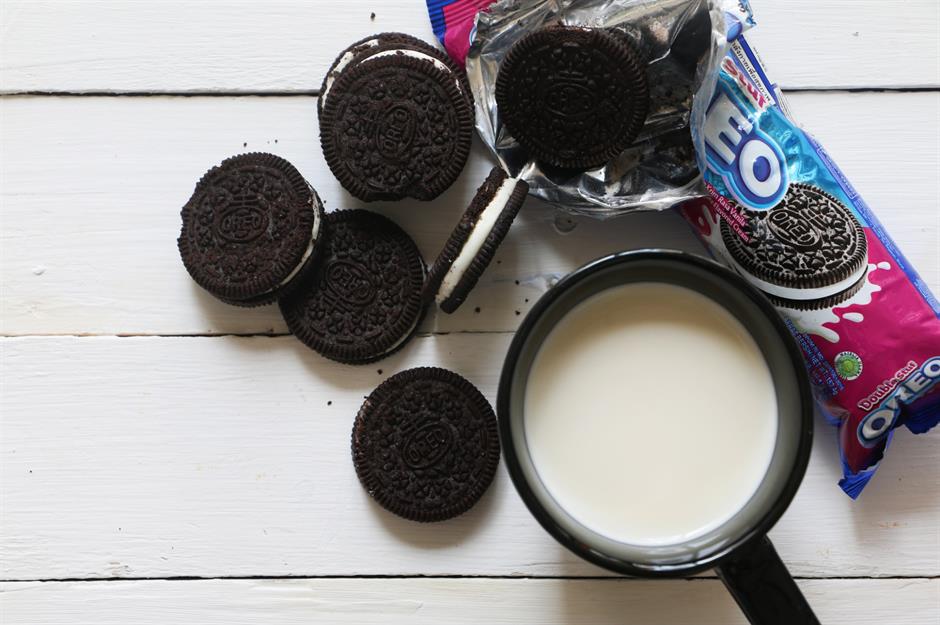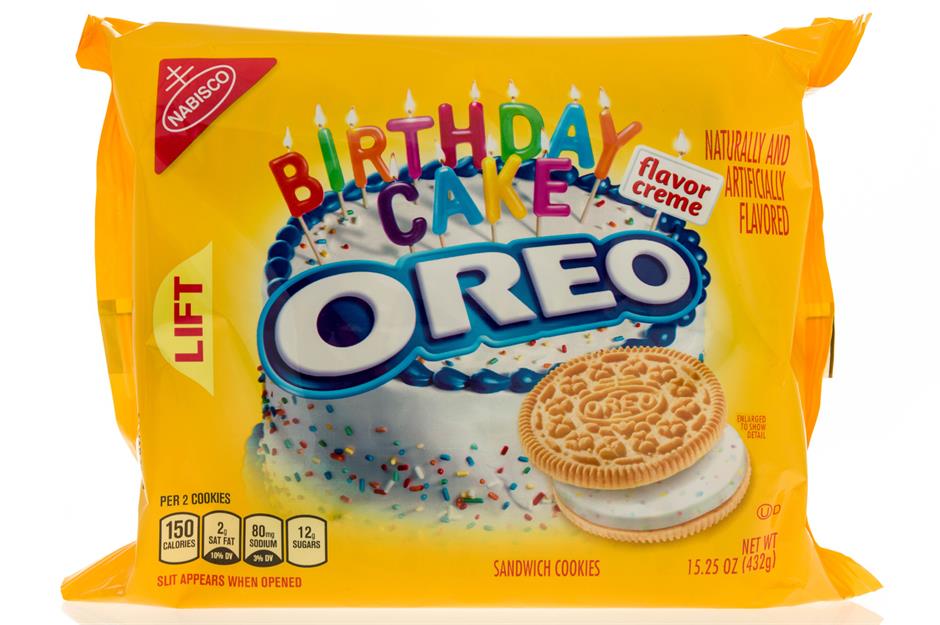25 delicious facts you didn’t know about Oreos
Secrets of the iconic biscuit brand
Oreos are one of the most popular cookie brands in the world. Yet the beloved sandwich biscuits, which have been around for more than a century, have some surprising secrets. Intrigued? Keep reading for 25 delicious Oreo facts.
Oreo is 109 years-old
You might be surprised to know that the ‘Oreo Biscuit’ was introduced by the National Biscuit Company – today part of Mondelēz International, the parent company of Nabisco and Cadbury – on 6 March 1912. This means it’s a whopping 109 years-old this year.
The cookie wasn’t the first of its kind
It would be easy to assume that Oreo was the first brand to introduce this distinct cookie. However, that’s not actually the case. The first chocolate sandwich biscuit with a crème filling, called Hydrox, was created by rival company Sunshine Biscuit Company in 1908. Oreo has never directly cited Hydrox as its inspiration but there’s no denying that it came first.
Oreos were sold by weight
Initially, Oreos were sold by weight. According to Oreo’s former archivist, speaking to the New York Times in 1986, the first cookies were sold to a grocer in New Jersey at a total cost of $2.35 (£1.69) for nine and a quarter pounds (4.2kg).
Love this? Follow our Pinterest page for more food inspiration
There have been several different names
In 1921, the ‘Oreo Biscuit’ became the ‘Oreo Sandwich’ and was renamed yet again in 1948 to become the ‘Oreo Crème Sandwich’. The brand was retitled one last time in 1974 as ‘Oreo Chocolate Sandwich Cookies’ and it has used this description on packets ever since.
A lemon meringue flavour existed
When the biscuits were first released in stores there were two flavours: original and lemon meringue. The chocolate biscuits dominated the market and lemon meringue was dropped in the early 1920s.
Check out these iconic American fast food brands that no longer exist
But where does ‘Oreo’ come from?
What’s in a name? Quite a lot actually. While there’s no official explanation as to how Oreos got their name, there are a few theories. Some say that it came from “or”, meaning gold in French, due to the biscuits’ former gold packaging. Others say that the two letter Os in the word represent the two cookies with the crème sandwiched in the middle. Whatever the story, the name is recognised around the world today.
You can find Oreos in more than 100 countries
The biggest markets are the US, China, the UK, Indonesia, Canada, Mexico, Spain, Argentina, India and Germany. In fact, the US and China alone accounted for 70% of Oreo’s business in 2019. The brand broke the $2 billion (£1.4bn) sales mark in 2016 and it’s one of Mondelēz International’s most valuable brands. Since 2010, five more countries have been added to the Oreo roll call: India in 2011; Pakistan and Brazil in 2013; and Russia and Morocco in 2015.
More than 40 billion cookies are produced per year
Yes, you read that right. In fact, if they were stacked on top of each other these 40 billion biscuits would be able to circle the earth five times. That’s a lot of cookies and crème…
There’s even a street named after Oreos
Oreo Way, a stretch of Ninth Avenue between 15th and 16th streets in New York City, gained its new name in 2002. It's in homage to the fact it’s the site of the former Nabisco bakery (pictured) which made Oreos. Today, the spot is home to Chelsea Market.
Half of us eat Oreos the same way
Do you twist, lick and dunk your Oreos? Or just bite straight into them? Oreo says that 50% of snackers twist and pull their cookies apart before eating, sometimes without dunking them into milk. Supposedly, women are more likely to twist their Oreos before eating than men.
They could be as addictive as hard drugs…
Anyone else guilty of getting through half a packet in one sitting? According to a study by researchers at Connecticut College in 2013, Oreos activated the same “pleasure centre” in the brains of lab rats that was activated by cocaine and morphine. Interestingly, the researchers also found that the rats liked to eat the crème filling first.
You can get ‘half and half’ Oreos
But only in Argentina. Sorry. Oreo Duo, with a two-flavoured crème filling, comes in strawberry/vanilla and banana/dulce de leche varieties. Meanwhile in Indonesia you’ll find flavours including Blueberry Ice Cream, Orange Ice Cream and Oreo Softcake.
You can get Green Tea Ice Cream Oreos in China
Oreo cookies with green tea ice cream-flavoured crème are incredibly popular in China – but they’re not the only unusual flavour available there. Other wonderful filling variations include Oreo Double-Fruit in Orange/Mango, Raspberry/Blueberry and Peach/Grape combinations.
Cherry Cola Oreos exist in the United States
Berry lovers do not need to go to China for their favourite flavour – Cherry Cola Oreos are one of the many types for sale in the United States, as well as Mint, Apple Pie, Banana Split and Strawberry Shortcake, to name a few.
Triple chocolate Oreos are a thing
Chocoholics look no further: you can get Oreos with three types of chocolate in them. But you’ll only find them on shelves in Mexico. Each cookie features a different type of chocolate and a third is buried within the crème.
Birthday cake anyone?
Who needs a cake when you can have a cake-flavoured cookie? Rounding off the unusual varieties, the brand released a Birthday Cake Oreo in 2012 to mark its centenary, and the flavour has remained on store shelves ever since.
Students calculated the cookie-to-filling ratio
Standard Oreos contain just 21% crème compared to 79% cookie. Meanwhile, Double Stuf Oreos don’t actually contain twice the amount of filling – more like 1.86 times the amount, according to a high school maths experiment. To arrive at these findings, students diligently scraped out the filling from the biscuits to weigh each component.
The filling used to contain lard
Speaking of the crème, it used to contain pork fat until the 1990s, when it was removed for health reasons. In 1998, Oreos were declared kosher by OU certification in the United States and it transpired that a lot of money was spent converting the bakeries in line with Kashrut. The removal of lard also made them vegetarian.
Oreos technically aren’t vegan
Despite tasting so deliciously creamy and chocolatey, the recipe for Oreos doesn’t contain a drop of dairy, meaning some have argued they’re vegan. However, the company warns that cross-contamination with dairy products in factories is possible, so the cookies aren't suitable for those following a plant-based diet.
Oreos once set a Guinness World Record...
In 2009, Oreos were the food used in the world’s largest blind taste test in Madrid, Spain. The record was achieved after 1,471 people were blindfolded and given the cookies.
...and then another
In January 2020, Oreo made it into the Guinness Book of World Records again. The snack brand announced it had set the record for the most people dunking cookies simultaneously across multiple venues, with 5,066 people taking part. The record was set to celebrate Oreo reaching $3.1 billion (£2.2bn) in sales in 2019.
There have been nine different marketing campaigns
Oreo has been clever with its advertising over the years. One such ad campaign was the ‘Oreo Dunk Challenge’ launched in 2017, challenging fans in 50 countries to 'reconnect with their inner child' by taking a video of themselves dunking a cookie in milk. With big names including basketball legend Shaquille O’Neal and Christina Aguilera fronting the social media campaign, it was memorable and fun.
Discontinued flavours are in a museum
At the Museum of Failure exhibition in Los Angeles, you’ll find a whole wall of flavours that never quite made it. Among them: Swedish Fish, Peanut Butter and Jam, Candy Corn and Key Lime Pie. They sit alongside other foods and drinks that flopped, including obscure Coca-Cola flavours.
It takes two hours to make each cookie
How exactly are the biscuits made? In short: flour, sugar, cocoa, water and a few other ingredients are blended together in a huge tub, before the biscuits are moulded and embossed, baked, and then filled. According to Mondelēz International, the popular biscuits take two hours to make and bake. We can guarantee they get eaten a whole lot quicker.
There is a national day
Like all popular foods, Oreos has its own national day on 6 March. The day is dedicated to twisting, licking and dunking from dawn until dusk.
Now look at these nuggets of knowledge you didn't know about fast food

